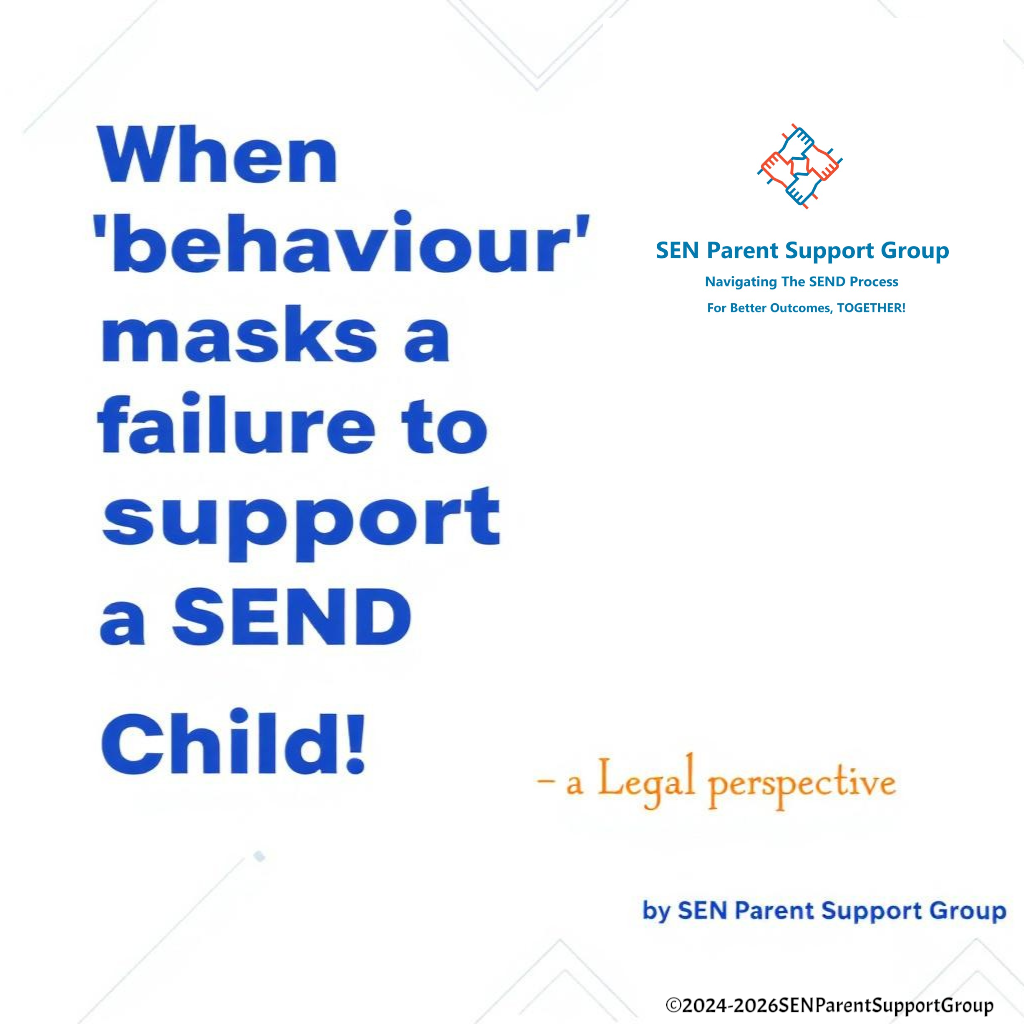A Legal Perspective from SEN Parent Support Group
Schools have a statutory duty to support pupils whose needs affect their behaviour. When an incident is chalked up simply as “misbehaviour” without the school delivering the reasonable adjustments or SEND support your child requires, the school becomes complicit in perpetuating that child’s distress and denying their legal rights.
Schools’ Duty to Have and Follow a Behaviour Policy
Under Section 89(1) of the Education and Inspections Act 2006, every maintained school must establish, publish and consistently apply a written behaviour policy. That policy must set out:
- measures to promote good behaviour, self-discipline and respect
- steps to prevent all forms of bullying
- sanctions for pupils who fail to follow school rules
When a pupil’s behaviour stems from an unmet need such as sensory processing differences, anxiety or trauma, labelling an incident as mere “defiance” without exploring the underlying cause runs counter to the purpose of a policy that exists to deliver fair, safe and inclusive discipline . So, how is that changed for SEND CYP?
Reasonable Adjustments under the Equality Act 2010
A child with special educational needs or a disability is protected under the Equality Act 2010. Schools must anticipate barriers and put in place reasonable adjustments so that such pupils can access education on the same basis as their peers. Reasonable adjustments in the context of behaviour may include:
- sensory breaks, safe-space access or time-out cards
- visual supports and clear routines
- staff training in de-escalation and trauma-informed approaches
A more comprehensive list of adjustments can be found here: this link focusses on ADHD for example: Click here
Failing to make adjustments that would have prevented the behaviour incident is a breach of the school’s legal obligation to eliminate discrimination and advance equality of opportunity for disabled pupils. Template letter for these situations here. Click Here
Statutory SEND Support: APDR and EHC Plans
The Children and Families Act 2014 and its SEND Code of Practice require schools to employ the Assess-Plan-Do-Review (APDR) cycle whenever a pupil’s needs aren’t met by high-quality classroom practice alone. Key features include:
- a thorough assessment of educational, health and social needs
- a plan of targeted interventions with measurable outcomes
- regular reviews to adapt provision
The measurements used within the APDR cycle are within the four core areas of need. Click here to do a parental assessment to start this process. Click here for the supporting tool to help you complete this parental assessment.
If a school dismisses an incident as “poor attitude” without triggering APDR even when the child has an Education, Health and Care plan (EHCP) it has failed its statutory duty to identify, review and adjust provision to meet that child’s assessed needs.
Recording and Reporting Physical Interventions
Where a pupil’s behaviour risks harm, staff may lawfully use reasonable force. Recent statutory guidance requires schools to record and report every “significant incident” involving force “as soon as practicable” and to retain that record against abuse of policy or practice .
A record should include:
- date, time and location of the incident
- names of staff and pupils involved
- a clear description of the intervention and any follow-up actions
If an incident is misclassified as routine “behaviour management” rather than a serious safety intervention, the school undermines transparency and accountability in its duty of care. A SAR or Subject Access Request often highlights what we as parents are not told.
When Omission Equals Complicity
By failing to:
- investigate the root cause of behaviour
- implement reasonable adjustments or APDR interventions
- record and report serious incidents properly
a school doesn’t merely miss an opportunity to support; it actively breaches statutory duties. That omission compounds the harm to the child and can amount to unlawful discrimination, safeguarding gaps or even human rights infringements where neglect escalates risk.
Enforcing Your Child’s Rights
If your child’s behaviour incident has been wrongly framed and therefore left unsupported you have several avenues:
- Raise a Formal Complaint
Trigger the school’s complaints procedure, citing Section 89 Education and Inspections Act 2006, the Equality Act 2010 duties, and the SEND Code of Practice. Click here for 1st Stage template letter and review our Resource hub for Complaints Procedures - Seek an EHCP Review or request a meeting with SENCO and Head of Year.
Request an urgent annual review or re-assessment if existing provisions have failed to prevent serious incidents. Click here for EHCP AR Timeline - Mediation and SENDIST Appeal
Use statutory mediation or, if unresolved, appeal to the SEND Tribunal for non-compliance with EHCP duties. - Judicial Review
In extreme cases of systemic failure, challenge unlawful policy omissions through judicial review of school decisions.
By holding schools to their legal obligations rather than accepting “behaviour” as a catch-all label you secure not only redress for your child but set a precedent that strengthens provisions for every vulnerable learner you champion.
If you need templates, statutory references or one-to-one guidance on challenging “behaviour” labels and securing lawful provision, explore our resources or book a mentor support call.
For peer support: join 21k SEN Parents who receive unprecedented support in our closed Facebook Group. Click here to join

Understanding SEND
All Things EHCP
- LETTER: LA Failure To Notify If Issuing the plan
- RESOURCE: Moving Local Authorities
- LETTER: Mediation Agreement – LA agreed to issue/amend EHCP but hasn’t provided draft within 5 weeks
- LETTER: Refusal To Assess Won and LA Not Notified of EP Assessment Within 2 wk Timeframe
- LETTER: To LA – After Tribunal – Refusal to Issue. No Draft plan within 5 week timeframe.
Attendance, Exclusions & Sanctions
Complaints
- LETTER – Enforcing Interim Education S43 with LA + Escalation Letter + Tribunal Request
- LETTER: To School When Whole School Approach To Adjustments Is Not Applied Consistently (IEP or EHCP)
- RESOURCE: LGO Outcomes
- LETTER: Right to Choose Rejection 3 Step Complaints Letters
- RESOURCE: Core Deficit Supporting Tool








